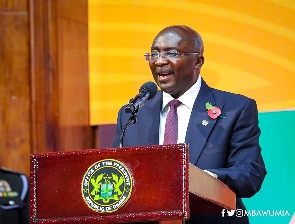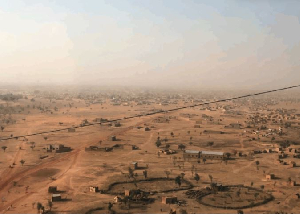Vice President, Dr. Mahamudu Bawumia has outlined three major ways in which digital technology has been utilised to advance healthcare delivery in Ghana.
Speaking during an event held to mark NHIS Active Month in Tamale in the Northern Region, the Vice President listed the networking of hospitals, provision of medical drones and the establishment of the e-pharmacy platform as the major interventions brought to healthcare in Ghana by digitalisation.
The Vice President appeared as the keynote speaker for the event, being held under the theme, “The Role of Digitalisation in Modern Healthcare Delivery: Recounting Ghana’s ICT Journey in the 4th Republic,”
Speaking on the theme, Dr. Bawumia outlined the advances in healthcare delivery that have come about as a result of the government’s relentless digital agenda.
“Digitaisation has been key in the healthcare space. One of the key areas we have embarked on is the digitalisation of our hospitals and medical records. Before the govt commenced systematic digitalisation of medical records at public health facilities, all documents and records were paper-based. The process of locating patient files was cumbersome. Some files were misplaced or misfiled. You can go to the hospital and they will say they can’t find your file. This caused delays in the delivery of health services. This [[digitalisation] effort has increased efficiency, effectiveness and productivity in service delivery in our health facilities, eliminating the need for queues and delay and increasing access to healthcare.
“Going forward, medical records and the history of patients can be gathered under a single database which can be accessed by any networked hospital when the patient visits. So we’ve embarked on the connection of health facilities under the Ghana Health Service on one digital platform. So for all the Teaching and Regional hospitals, we’ve connected them and they can talk to each other. This is taking place under the Lightwave project. The idea is to network all hospitals in Ghana, so far we have completed 147 hospitals under the Lightwave project. All Teaching and Regional hospitals have been networked and we are proceeding with other hospitals.” Bawumia said.
The Vice President went on to list Hospitals in the Northern part of the country that has been added to this national network.
“In Northern Region, we have Tamale Teaching Hospital, Northern Regional Hospital, SDA Hospital and Tamale West Hospital. In North East [Region we have] Bunkpurugu Health Centre, Binde Hospital, Chereponi Gov’t Hospital, Walewale Hospital, Gambanga Hospital, and Yanga Hospital. In Upper East, Zebila, Bongo, Sandema, War Memorial, Paga, Talensi and Upper East Regional Hospital. We have also networked Upper West Regional Hospital. The goal for us is by next year we would reach 80% of all hospitals and by 2024, 100% of all hospitals in Ghana will be networked.
“This is very, very major. What Ghana is doing, we would be the first country in Africa to do it. And in the world, there are only 3 countries that have done this network – Germany, India and China. And if we finish it, we will be no.4 in the world. That is something major, and that is something we should be proud of,”the Veep added.
Bawumia went on to list the other two major healthcare advancements – the medical drone service and the e-pharmacy platform.
“Another area we have used digital technology to advance access to healthcare is through medical drones. Hospitals and clinics in remote and rural settings have a difficult time getting medical supplies, especially in emergencies involving snake bites, childbirth, blood supplies needed etc…to address this problem, Ghana opted to partner Zipline, the world’s largest, automated, on-demand delivery service for medical supplies.
“Ghana is the 2nd country in Africa after Rwanda to implement the delivery of medical supplies to remote areas through drones. Today, Ghana has six medical distribution centre for drones…and these six centres are delivering massive services and saving lives every day across the country. It is important to note that currently, our dear country Ghana is the world’s largest medical drone delivery service. More impressively, all the drone centres are 100% manned by Ghanaians.
“So far, the drones have done 278,936 flights. When a drone is flying, it is taking urgently needed medicine – blood, anti-snake serum, vaccines etc – they’ve done 278,936 flights and delivered over 12 million deliveries…so you can see the drones are saving lives.” the Vice President said.
“A third area that we have focused on is the e-pharmacy. Patients generally face difficulties when trying to find medicines in pharmacies. They could go to four, five, six pharmacies before getting lucky. In 2019, I challenged the pharmaceutical society of Ghana to digitalise the operations of pharmacies in Ghana. The pharmacy council in collaboration with the private sector has completed work on a digital platform for all pharmacies in Ghana,” he continued.
The digital platform, the National Electronic Pharmacy Platform (NEPP), is an electronic pharmacy where patients can upload their prescriptions and buy drugs at affordable prices to be delivered to their homes.
“Basically, the digital e-pharmacy platform would offer the opportunity to everyone through a mobile phone to upload a prescription and find out which pharmacies near you have the drugs. You can compare the prices for the same drug offered by different pharmacies and you can buy from the lowest-priced pharmacy. You will be able to pay with your mobile money or scan and pay and you can have the medicine delivered to you at home.
“We are expecting that in January 2023, we would go live with a full rollout of the e-pharmacy platform in Ghana. This is major, this would make Ghana the first country in Sub-Saharan Africa to have a national-scale e-pharmacy and one of the only few countries in the world to have it,” Dr Bawumia added.
The Vice President also celebrated the improved services the National Health Insurance Scheme (NHIS) has been able to offer due to digitalisation.
“The National Health Insurance Authority (NHIA) is digitising operations to reduce fraudulent claims. The renewal of all NHIA registrations used to take place at district offices…leading to backlogs and queues. In some instances people slept there for days, [and] these delays hampered the operations and limited the revenue streams of the NHIA. Following digitisation, renewal of NHIA registration via mobile phone has eliminated these bottlenecks and increased access to healthcare by those who need it most.,” Bawumia explained.
Health News of Monday, 5 December 2022
Source: peacefmonline.com













